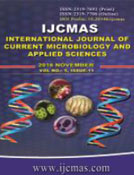


 National Academy of Agricultural Sciences (NAAS)
National Academy of Agricultural Sciences (NAAS)

|
PRINT ISSN : 2319-7692
Online ISSN : 2319-7706 Issues : 12 per year Publisher : Excellent Publishers Email : editorijcmas@gmail.com / submit@ijcmas.com Editor-in-chief: Dr.M.Prakash Index Copernicus ICV 2018: 95.39 NAAS RATING 2020: 5.38 |
This research was to carry out an environmental surveillance for cellulose-degrading microorganisms present in wastes dumpsites in Lagos, southwest Nigeria. Solid waste has become a heavy burden to both government and citizens in developing countries all over the world due to increase in population. The presence of cellulolytic microorganisms and their potential to degrade the complex polymer; cellulose into simple sugars like glucose under optimum environmental conditions were also evaluated. Soil and leachate samples were collected (0 -10cm depth) from three dumpsites in Lagos following aseptic procedures and the microbial species were isolated using Nutrient agar and Potato-dextrose agar media respectively. A total of 34 microorganisms were isolated from the three different sampling locations in Lagos. The cellulase-producing microbial species were characterized following conventional and standard microbiological methods. They were then screened for cellulase activity using the Cellulose Congo-Red plate technique. The diameters of clear zone of inhibition were measured in millimeters (mm). All isolates were cellulase producers, with Bacillus licheniformis having 42.5% occurrence, as well as the highest cellulase activity and hydrolytic value (34mm and 8.5 respectively) among the bacterial species while Aspergillus sp.(40.0% occurrence) had the highest cellulase activity (63mm) and hydrolytic value (15.8) among the fungal species. This result suggested that these microorganisms utilized the available sources of cellulose present in wastes both for growth, biomass production and biodegradative processes. Consequently, the introduction of these microorganisms into waste recycling processes will enhance the sustainable solid waste management practices for megacities as well as the quality of public health in developing economies.
 |
 |
 |
 |
 |